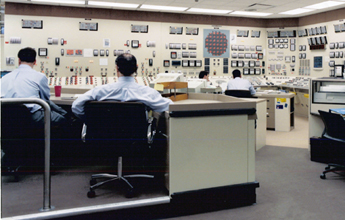Hill: IBEW is the nuclear work force of the future.
November 21, 2013
 |
| The IBEW has represented nuclear workers like these for more than half a century. Finding their replacements was the topic of an online panel featuring President Hill. |
How the nuclear power industry will find enough qualified workers to build, operate and maintain plants in the future was the topic of an online conversation featuring International President Edwin D. Hill and senior executives from industry.
Driving the demand is an aging work force – more than a third are at or near retirement age-- and new technologies, including new kinds of reactors and changing regulations.
There are 15,000 IBEW members working in 41 U.S. nuclear sites. During the webcast, called, “Getting Nuclear Built: The New Energy Mix and Workforce Development,” President Hill said IBEW members have played an indispensable part in building and maintaining the stock of nuclear sites for more than half a century and that we are committed to maintaining that position in the future.
“In the ‘50s, ‘60s and ‘70s we trained the people who built the existing nuclear plants and many of those folks are still out there,” Hill said. “We have people ready to go whenever they decide to build something, and any we don’t have, we can train.”
Also on the panel with President Hill was Mike Rencheck, president and CEO of the North American subsidiary of AREVA, a French multinational nuclear company, and Randy Edington, who oversees the Palo Verde Nuclear Generating Station -- the largest nuclear power plant in the United States – for Arizona Public Service Co.
The panel discussed initiatives to create a pipeline of qualified young workers and retrain workers from other industries to prevent a shortfall. The panelists agreed that key part of the strategy was getting students interested again in engineering, the trades and construction careers.
“We need to convince parents that craftsman is not a dirty word again. We have to concentrate on that as a nation,” Hill said.
Rencheck from Areva echoed Hill’s call. “I just don’t think parents or students understand the opportunity. This isn’t a job, it’s a career,” he said.
The participants also discussed the economic challenge the nuclear industry faces from the natural gas boom and the need for a national energy policy that would lay the foundation for a reliable, reasonably priced and clean energy generation system.
You can hear the panelhere. Registration is required.
Photo courtesy of the Nuclear Record Commission
|